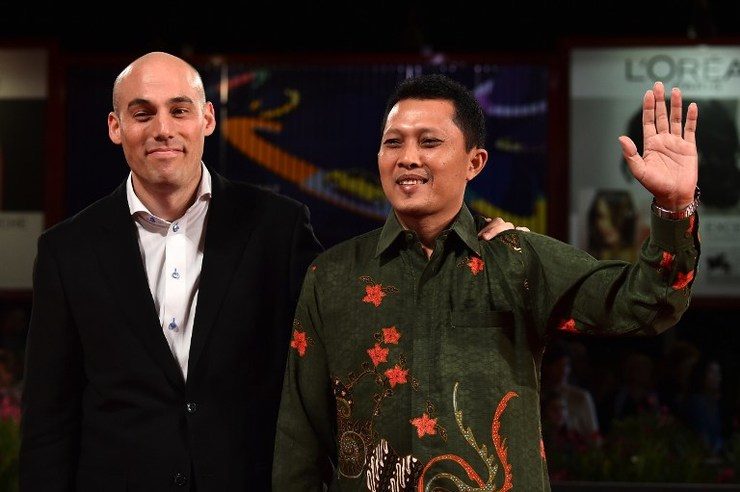SUMMARY
This is AI generated summarization, which may have errors. For context, always refer to the full article.

VENICE, Italy – Human blood is “both salty and sweet” to drink, a mass murderer explains in “The Look of Silence”, Joshua Oppenheimer’s stunning documentary which premieres Thursday, August 29, in Venice.
The director returns to the subject of his acclaimed “The Act of Killing” about the murder of over a million “communists” following Indonesia’s 1965 coup – but takes it a step further, this time following a man called Adi who confronts his brother’s killers.
“We slit their throats and collected the blood in a glass. If we hadn’t drunk human blood we would have gone crazy,” the superstitious leader of a village death squad tells Adi, who seeks in vain any sign of remorse among the murderers.
Oppenheimer, 39, shot the footage for both works over a decade, but focused on Adi’s family in particular during 2012, documenting the affect his confrontation of the past has on his elderly parents, wife and two children.
‘It frightened us all’
Killers and families of victims live next door to each other all over Indonesia, each aware of who the other is, but each – particularly the survivors – unwilling to open the wounds of the past.
There is a hostility among the killers interviewed in “The Look of Silence” not seen in the first documentary, and after on-camera threats to expose Adi as a secret communist, he and his family have been relocated across the country.
“The Act of Killing” – in the running for Venice’s Golden Lion award – was only released once filming for “The Look of Silence” was complete, because the Texas-born director knew that once it was made public it would not be safe for him to return to Indonesia.
“I receive threats all the time. I am not a brave man, I scare easily,” the soft-spoken Oppenheimer told AFP on the beach-front in Venice, playing down scenes which send shivers of fear and disgust through the viewer.
“Making ‘The Look of Silence’ frightened me, I think it frightened us all,” he said.
“We took precautions, only using a foreign film crew and having two getaway cars outside at all times. We’d often pretend to be having technical errors with the equipment in order to buy time to let situations calm down,” he added.
Adi, an optician in his early 40s, uses his trade to open lines of communication with the killers, asking while he tests their eyesight about their roles in murdering the “communists”, who were in fact anyone seen as an enemy of the military, including intellectuals and ethnic Chinese.
The documentary includes an excerpt from a 1967 American television report on the massacres as well as a killer praising the US for teaching him to hate communists. It is clear Oppenheimer is pushing once more for a reaction from the West, which he insists not only ignored the killings but encouraged them.
‘Children fed propaganda’
One of the most raw and heartbreaking moments is when Adi discovers a member of his own family had a part to play in the death of his brother Ramli, who was imprisoned then savagely butchered before being flung like others into the Snake River.
Two of the killers show Oppenheimer the spot he was murdered, laughing about how they decapitated their victims – “the bodies float, the heads bob up and down!” – before, chillingly, taking a moment to admire and smell flowers along the river bank.
One of the driving factors behind Oppenheimer’s decision to make both documentaries is summed up by the scene at Adi’s son’s school, where a history teacher defends the massacre and praises the state for protecting democracy.
“Nothing has really changed and the children are still being fed propaganda. It’s a banal, quotidian nightmare,” the director said.
Adi said the documentary brought answers and relief on a personal level, but warned that “there is still discrimination against families of survivors in Indonesia and we always feel we are living under the shadow of the killers.”
Despite failing to get an apology from the murderers, he said he hopes that “the perpetrators will acknowledge what they did, that it was wrong and that we are not evil – indeed it was they who did something horrific.”
In the same tone of quiet compassion which so effectively contrasts the arrogance of the killers on screen, he said he wants “us to be able to forgive each other, an essential step to convincing each other we can live together.” – Rappler.com
Add a comment
How does this make you feel?
There are no comments yet. Add your comment to start the conversation.